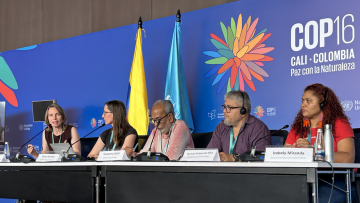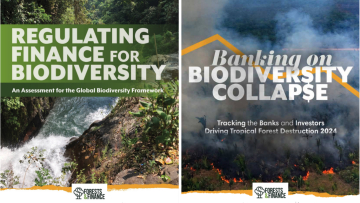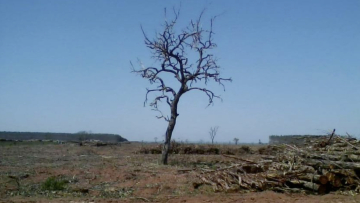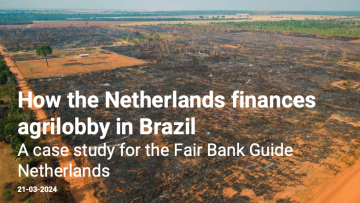
Company – Active
This profile is actively maintainedBankTrack & Environmental Paper Network
nature@banktrack.org
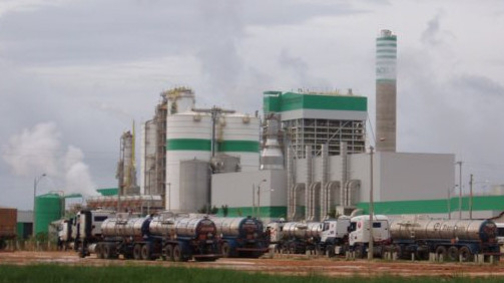
Company – Active
This profile is actively maintainedBankTrack & Environmental Paper Network
nature@banktrack.org
Why this profile?
Suzano is the world's largest eucalyptus pulp producer and exporter of market pulp. It has 1.3 million hectares of eucalyptus plantations which inevitably cause impacts such as the reduction of water availability, the increase in fire risks, the exhaustion of soils, the pollution of land and water by pesticides, the reduction of biodiversity and, indirectly, deforestation. The company is also involved in a history of land conflicts with Indigenous and traditional communities and it leads Brazil's research on transgenic eucalyptus trees which has been forbidden by the Forest Stewardship Council (FSC).
What must happen
Investors and financiers of Suzano should engage with the company to ensure that no further expansion of its plantations can be carried out if it is not clear what the impacts will be on the environment and local communities. They should also use their leverage to demand the company addresses the ongoing impacts of its activities by ensuring that the company fully respects the rights of traditional and Indigenous communities, including that of Free, Prior and Informed Consent (FPIC), and brings working conditions in line with ILO and national standards. Furthermore, the company must, as a matter of course, publish environmental impact assessments, calculations of its CO2 emissions from land use change, land acquisition agreements, consultation meeting minutes and other relevant materials. In the case of noncompliance, financial institutions should suspend their finance for Suzano.
| Sectors | Pulp, Paper and Paperboard Mills |
| Headquarters |
|
| Ownership |
listed on Brazil Stock Exchange
Suzano's main shareholders as of 31 Dec 2019 are: Suzano Holding (27%), Board members and management (18.7%), BNDESPAR (11%), Votorantim (5.5%). Suzano's complete shareholder structure can be accessed here. |
| Subsidiaries |
Fibria – Brazil
|
| Website |
Suzano, based in São Paulo Brazil, is the world's largest eucalyptus pulp producer and exporter of market pulp, since it merged with Fibria in January 2019. It has a production capacity of 11 million tonnes of pulp per year. The company develops fibre plantations and it owns pulp mills, paper mills and energy plants, all located in Brazil. It also owns the biotechnology company Futura Gene, which apart from Brazil, has operations in Israel, the USA and China. As of early 2019, Suzano had a landbank of 2.3 million hectares, of which 1.3 million hectares contained plantations, and it owns 8.5 pulp mills. Suzano's current pulp production capacity is 10.9 million tons, and its newest project (the Cerrado Project) is expected to produce 2.55 million tons, increasing the company's production capacity by 20%.
Impact on human rights and communities
Land conflicts Suzano has a landbank of 2.3 million hectares, of which 1.3 million are tree plantations. The acquisition of this large landbank has led to several conflicts over land, mostly with indigenous, quilombola and (landless) rural workers communities. Some of the strongest land conflicts occur in the states of Espírito Santo and Bahia, where three of the company’s mills are located. Another region of strong conflict is in the border region between Maranhão and Piauí, where Suzano continues to expand its eucalyptus plantations despite failing to build a mill in the region.
Conflicts around the Aracruz mill date back to 1967, when it displaced thousands of indigenous, quilombola (afro-descendant communities) and fishing communities to establish large eucalyptus plantations. Today, this impact is still ongoing and only a fraction of the quilombola families remain in their traditional territories, struggling to survive surrounded by the eucalyptus. Deprived of means of income, they are heavily criminalised for using the eucalyptus trees, which they say are planted on their lands, to produce charcoal. There are also at least six eucalyptus farms that have been occupied by the MST, which claims that these were actually established on public lands that should have been earmarked for agrarian reform. Apart from the land conflicts, the quilombolas also suffer from lack of water and intoxication by pesticides. The quilombolas say that the excessive use of pesticides has already killed several people, and has increased the cases of cancer and of blindness. According to FASE, in the North of Espírito Santo, over 130 streams have dried up since the eucalyptus plantations were introduced in the region.
After years of land conflicts and occupations around the Veracel mill, which is a joint venture between Stora Enso and Fibria, the company made an agreement with six social movements and government bodies which involved the sale of 16,500ha to the government for the purpose of agrarian reform, the creation of sustainable settlements, as well as a commitment from the social movements that they would no longer occupy the land. But after the accord was signed new conflicts have arisen. The movements that signed the agreement accuse Veracel of applying divide and rule tactics, and new social movements have arisen which, by 2015, had occupied another 5,700ha of land claimed by Veracel.
In the region of the Baixo Parnaíba, in Maranhão, Suzano and its subsidiary Paineiras are involved in several land conflicts. The company and related third parties are accused of evicting peasant families with customary rights from their land. One estimate shows that around 70% of Suzano’s plantations in the region resulted from land grabs. There are also land conflicts in the region of Palmeirais, in Piauí, where third parties are accused of terrorising local communities with the aim of obtaining their land to plant eucalyptus to be sold to Suzano. In both cases, Suzano announced that it would build a pellet or pulp mill resulting in a rush for land to plant eucalyptus. However, the trees have since matured but the mills were not built.
Impacts on Indigenous communities Between 2003 and 2019, 539 Indigenous People have been murdered in Mato Grosso do Sul, which represents almost 40% of the total killings of Brazilian Indigenous People. This region, which was once inhabited by Indigenous Peoples, is now dominated by eucalyptus plantations and only a single Indigenous community survives here on an area of 484 hectares. Their land has been demarcated and is regularly registered, but after twenty years they are still waiting for official recognition by presidential decree. This community caught the attention of Suzano when it announced support for a community project aimed at “training handicraft production groups through guidance on entrepreneurship”. However, the project only involved 12 people and assured them a family income much lower that the minimum wage in Brazil. In 2021, the project was suspended “due to a change in the community’s leadership”.
Lack of Free, Prior and Informed Consent Suzano has failed to respect Indigenous Peoples and local communities' right to a process of Free, Prior and Informed Consent (FPIC). This is because FPIC is not considered necessary for all local communities in the region, only those that are registered as Indigenous. However, there are many unregistered groups and more Indigenous Peoples that have lost their ancestral territories and are now scattered across the region that are still being impacted, but are not having their rights respected by Suzano or other companies. An example of this is the Cerrado Project, which was announced by Suzano in May 2021 and is being financed by IFC. The IFC disclosure website excludes the application of IFC Performance Standard 7 regarding Indigenous Peoples since it did not identify Indigenous Peoples inside the operational footprint of the project and its area of influence. However, this fails to identify that the area where the mill is planned, and where it has its plantations, used to be ancestral land of three indigenous communities: Tekohá (Guarani), Kayapó do Sul, and Ofayé. These Indigenous communities were cast off their land and dispersed by the cattle ranching some time ago, meaning there is no longer a registered community in the area. These people are now invisible, but they keep suffering from the land use changes affecting their land.
Dangerous working conditions and labour violations In 2015, Fibria (now absorbed by Suzano) fired 18 workers in retaliation for organising an independent worker union. Workers who contracted diseases due to dire woor conditions an poor quality machinery were also fired. Plantation workers complain of poor and unhealthy working conditions. Poorly maintained machines can be dangerous and their use can cause musculoskeletal injuries. There is often no adequate time nor shelter for eating, there is a lack of restrooms in the workplace, so bodily needs must be met in the fields with the constant risk of coming into contact with venomous animals such as spiders or snakes. In recent years a number of labour condition irregularities and labour legislation violations have been reported. According to the Public Ministry of Labour (MPT), in Mato Grosso do Sul there are 65 labour cases filed against Suzano. The industry has also sustained a history of union busting.
Impact on climate
Emissions from biomass energy In May 2021, Suzano announced plans to build the first “zero fossil fuel pulp plant” in Brazil with an annual production capacity of 2.3 million tons and production scheduled to commence in 2024. However, Suzano’s “zero fossil fuel technology” will not reduce GHG emissions, but increase them. This will produce more emissions per unit of energy than coal. The “Cerrado Project” would likely emit between 320,000 and 330,000 tCO2eq/yr., equivalent to respectively 160,000 or 165,000 tons of coal burned every year. These emissions will not be compensated by the use of wood from trees grown by sequestering carbon, as these trees will soon be harvested again and burned or used for a short-live product such as paper.
Green Bonds In 2016, Suzano launched USD 500 mln worth of green bonds on the international market and another R$ 1 bln worth on the national market. In addition, it sold another USD 200 mln worth of Green Bonds in 2017. The proceeds of these bonds were mostly used for plantation management. The company’s assumption of these bonds is that the plantations have a positive impact as the work as CO2 sinks and thus contribute to mitigate climate change. However, most of these plantations will be transformed into short lived consumer products, which will release large parts of their CO2 content back into the atmosphere after they have been disposed of. This undoes the initial positive effect of the plantations as carbon sinks. Apart from a possible contribution to mitigate climate change, plantations are not very “green”. Monoculture plantations have a very low biodiversity, occupy vast areas of land, use large amounts of water and create very few jobs.
Impact on nature and environment
Fibre sourcing The establishment of large monocultures is very detrimental to biodiversity and the conservation of valuable biomes. Though Suzano’s involvement in direct deforestation for the establishment of plantations is limited, apart from the Baixo Parnaíba and Piauí regions, the plantations do indirectly contribute to land use change and deforestation in other areas for competitive uses. Suzano claims it has a vast area of preserved forests, far more than the legally required. However, the company does not provide georeferenced maps of the areas it owns, leases or sources from. Although around 70% of its landbank is FSC certified, FSC also does not disclose georeferenced maps of the plantations it certifies. This makes social control on compliance with both the law and the certification criteria impossible.
Genetically Engineered Trees In 2015 Suzano obtained permission from Brazil’s Biosafety Commission to commercialise a transgenic variety of eucalyptus trees. The variety H421 has been engineered to grow faster. Despite the authorization, Suzano claims it is not yet using the genetically engineered eucalyptus trees on a commercial scale. Doing so could mean it would lose its FSC certificate, as this is forbidden by the Certification Scheme’s Principles and Criteria. Suzano does not provide information about the location of its experimental plots of transgenic trees.
Impacts on water quality and availability Fast growing pulpwood plantations use vast amounts of water and often impact the availability of water for other uses, such as subsistence farming, agriculture or even drinking water. Though the industry stresses the fact that the Eucalyptus tree uses water efficiently and that its water use is similar to that of other plants (282 g water/g dry biomass according to one study), when compared to the use per biomass created, the problem with these trees is that they grow very fast, and thus when converted to water use per hectares, per year, it uses actually much more water than slow growing native vegetation. Long term research in South Africa has shown that the fast growing and exotic Eucalyptus trees require, on average, 30 litres of water per day. When planted at a density of 400 trees/hectare, this means 12,000 l/ha/day. This may cause water levels in nearby streams and wells, as well as the groundwater levels, to drop. Apart from the direct use of water by the trees themselves, there is also the impact from water being taken from rivers for irrigation purposes, the reduced uptake of water by soils due to erosion and the destruction of rivers and streams when the land is being prepared for plantations. Complaints of water scarcity by communities that live nearby plantations are numerous, whether in the Baixo Parnaíba, in Espírito Santo or in Três Lagoas. Pulp mills also use vast amounts of water. The new and relatively efficient 1,5 mty mill in Imperatriz uses 168,000m3/day. In 2017, Suzano used 143 mln m3 of water.
This is especially concerning in the state of Espírito Santo as it is rapidly heading toward desertification. In just a few decades, the region has gone from being one of the last refuges for the seriously threatened Atlantic Forest, to having 36% of its territory officially considered susceptible to desertification, according to Brazil’s Ministry of Environment.
Water pollution On top of the high water usage of the pulp industry, it also pollutes waterways, both due to the excessive use of agrochemicals and due to the discharge of polluted effluent in waterways. The effluent of Suzano’s pulp mills contains among other things carcinogenic dioxins, as it uses chlorine in the bleaching process.
Impact on pandemics
The pulp & paper industry is associated with high rates of deforestation as well as monocultures of various crops. There is a growing body of evidence that shows the connection between deforestation and an increased risk for disease outbreaks and pandemics. For example, monocultures like eucalyptus plantations reduce biodiversity leaving species like rats and mosquitoes, which are more likely to spread dangerous pathogens, to thrive. This biodiversity decline results in a loss of nature disease regulation and poses a risk for human, animal and environmental health.
A list of shareholders of Suzano can be found on the Forests & Finance database. Listed below are financial institutions that have provided credit and underwriting services to the company.
Applicable norms and standards
Brazil's Indigenous Pataxó reclaim their land
2025
2025-07-10 00:00:00 | More than 600 families are threatened by evictions by Suzano
Suzano is currently seeking to evict over 600 families from the “Fazenda Jurema”, which is located in the Brazilian state of Maranhão. Many of the families threatened by eviction have lived on the land for decades and thus claim rights to the land. In fact, the land authority INCRA has already started a process to recognize these rights and to allocate the land to the communities through an agrarian reform process.
Brazil does not have a solid land ownership registration database, and many land titles are obtained in a fraudulent way, in a process known as grilagem. An estimated 12% of arable land has been illegally claimed through fraudulent land titles. Suzano’s landbank is no exception, and the company has already been convicted—on appeal—by a Brazilian court, for illegally acquiring territory.
The evictions are apparently planned for next week, starting on July 15th, and seem to be going ahead without a proper plan to support the evicted families.
2025-03-13 00:00:00 | Rural landless women in Brazil occupy land owned by Suzano
On March 13th, in the city of Aracruz (Espírito Santo, Brazil), 1,000 women from the Landless Workers’ Movement (MST) occupied land owned by Suzano Papel e Celulose, the world’s largest pulp producer, to protest the environmental impact of eucalyptus monoculture.
This action is part of a wave of protests that have also taken place across several Brazilian states, including Bahia, São Paulo, Minas Gerais, Rio Grande do Sul, Santa Catarina, Paraná, Rio Grande do Norte, Ceará, Goiás, Mato Grosso, Amazonas, Pará, Rondônia, Tocantins, Roraima, Pernambuco, Sergipe, Paraíba, and Piauí.
“Eucalyptus doesn’t make a forest, and it doesn’t put food on the table. Espírito Santo is going through a very difficult time due to the expansion of eucalyptus monoculture, which has been present here since the 1960s,” said one protester.
The protesters are demanding that Suzano honor a commitment it signed in 2011 to allocate 22 land parcels under its control for agrarian reform. This commitment was made in response to complaints about the damage caused by eucalyptus monoculture in the region. However, according to the MST, the commitment was never fulfilled, and the negative impacts have only worsened over time. Suzano now controls more than 500,000 hectares of eucalyptus plantations in the region and is planning to double its monoculture operations.
“This company has been responsible for the violent displacement of Quilombola communities in the municipalities of Pedro Canário and Conceição da Barra,” added a spokeswoman from Espírito Santo. In her municipality, Suzano alone controls 62% of the municipality’s arable land.
2023
2023-11-28 00:00:00 | Suzano’s ongoing disrespect for local communities and their traditional land
On November 28, Antônio Sapezeiro, leader of the Quilombola community of Nova Vista in Espirito Santo, Brazil, was filmed immobilized on a road, surrounded by security guards from Suzano and military police. This incident is indicative of the ongoing conflicts between Suzano, the world's largest pulp mill producer, and local communities over land rights. Despite receiving substantial financing for its sustainability pledges, Suzano has not been transparent about its adverse social and environmental impacts.
Suzano's conflicts with local communities are widespread, extending beyond Espirito Santo to Bahia and Maranhao. In Maranhao, Suzano failed to fulfill promises to local communities, leading to road blockades. In its clarification note, Suzano has claimed responsibility for recurring use of public force to manage the conflict over land with the community to which it theoretically that land belongs.
Suzano, one of Brazil's largest landowners, controls over two million hectares across five states, with minimal job creation from its mechanized eucalyptus plantations. Despite these issues, Suzano plans to double its land holdings in the next decade. The lands that Suzano acquired from third parties are home to more than 200 communities, including many Indigenous communities, claiming that land as their traditional heritage.
Despite these disputable social records, and despite the 262 possible and probable civil and environmental proceedings the company is facing, Suzano has succeeded in achieving high environmental, social and governance (ESG) ratings, and it continues to benefit from green funds: 39% of the company’s debt is linked to green financing and that amount is set to grow. Since 2016, Suzano has received over USD 35 billion from big players including JPMorgan Chase, BNP Paribas, Rabobank, Mizuho and Bank of America.
2022
2022-12-20 00:00:00 | Cerrado project, Ribas do Rio Pardo
In December 2022, Suzano secured a USD 725 million loan to build a new giant pulp mill project in Mato Grosso do Sul, in Brazil’s Cerrado biome. The International Finance Corporation (IFC) is financing USD 250 million, the remaining USD 475 million will be received from other banks (unknown at the moment). The planned capacity of the mill is 2.55 million tons of pulp per annum. The company has already acquired land for plantations, but has plans to acquire more to reach a total landbank of 600,000 hectares.
IFC justifies its support to the mill stating that it will have positive environmental effects, boast climate-friendly technologies, and promote economy-wide development and strengthen the competitiveness of Brazil's pulp and paper sector. This project however, as it is currently designed, will result in the opposite: it will harm the environment, add further threat to the global climate, affect local communities, and will not bring any development or competitiveness. The expected impacts of the project are detailed in this EPN briefing and an open letter sent to IFC by 40 Brazilian and international organisations.
In the area between Ribas do Rio Pardo and Três Lagoas there are more mills, run or planned by different companies such as the Chilean giant Arauco and Eldorado, controlled by the notorious Indonesian group Asia Pulp & Paper (APP). Within a decade the production of eucalyptus pulp has exploded from zero to more than 7 million tons per year. This is now the epicentre of pulp expansion in Brazil, hosting nearly a million hectares of eucalyptus plantations and two processing plants. This is why the impact of this mill is much worse.
2022-06-19 00:00:00 | Open Letter Denouncing Suzano Papel e Celulose’s glyphosate-resistant Genetically Engineered (GE) Eucalyptus
More than 50 organizations, networks and movements from Brazil and around the world denounce the release into the environment and the commercial use of a new transgenic eucalyptus from the Brazilian company Suzano Papel e Celulose!
The approval by the National Technical Commission on Biosafety (CTNBio) of the GE eucalyptus resistant to glyphosate, identified as 751K032, is a serious threat to life, to society and to nature. It was approved without any democratic consultation with Brazilian civil society in general and the neighboring communities of the areas where the plantations will be located in particular. The only concern was granting the license in the benefit of the commercial interests of Suzano Papel e Celulose, instead of the detrimental effect on life.
Organizations denounce the CTNBio decision from November 16, 2021 to approve the release into the environment, commercial use and any other related activities of the new GE eucalyptus developed by FuturaGene, owned by Suzano Papel e Celulose.
The letter ends by demanding the immediate revocation of the license granted for the use of Suzano GE eucalyptus 751KO32, as well as the action and intervention of the Federal Public Prosecution Service to revoke the decision made by the CTNBio, a decision made without a full public debate, especially in regions of Brazil that have been exposed for many years to eucalyptus monoculture.
Read the complete letter in English, Spanish and Portuguese.
2018
2018-12-01 00:00:00 | Suzano merges with Fibria to become world's biggest pulp company
In January 2018 rumours surfaced that APP’s Paper Excellence was interested in buying Fibria. A month later Fibria communicated that Suzano had also shown interest in merging with the company. In March, after a short bidding race, the controlling shareholders of Fibria accepted a USD11 billion bid by Suzano, in a deal to create the world’s biggest pulp producer. In November Brazil’s anti-trust authority, CADE, approved the deal.


